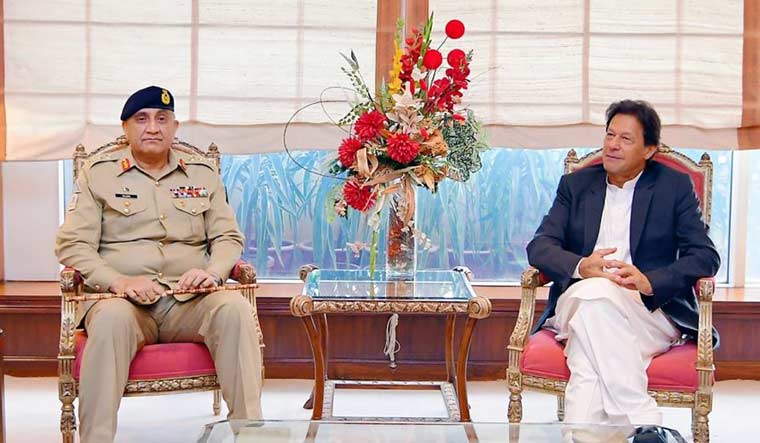As Pakistan pivots more towards the likes of China and Turkey, the change is not only seen in its international priorities. The establishment in Islamabad is also adopting the hostility of these new allies to press freedom.
The aforementioned observation was made by senior journalist Bashir Assad at a webinar organised by the Centre for Joint Warfare Studies (CENJOWS) on Thursday. The webinar, on the theme of civil society and minorities in Pakistan, brought together seasoned Pakistan watchers from the diplomatic and military communities. CENJOWS is Delhi-based think tank that was established by the ministry of defence in 2007 to promote research and interaction on national security and joint warfare issues.
Assad noted "About 21 senior journalists from mainstream media have quit; some have decided to leave the country or are doing freelancing," due to harassment by the Pakistani state, and in particular, the Pakistan Army. "The Army is employing every overt and covert means to suppress truth by journalists. Seven journalists have been killed since 2019; four have been abducted," Assad noted.
Assad explained the approach of the Imran Khan government on the issue of press freedom has not been encouraging. He alleged "cyber warriors" unleashed by the Imran Khan government were targeting journalists. While conceding that the killing of journalists in Pakistan has declined, Assad pointed out "freedom of press is declining since 2018".
Plight of Mohajirs, Pashtuns
Lieutenant General Syed Ata Hasnain (retired), who is a noted strategic commentator, spoke about the issues facing ethnic groups such as the Mohajirs and Pashtuns and religious minorities such as Ahmediyas and Shias.
Hasnain argued "Islam, instead of being a unifier [as intended at the time of Pakistan's founding], turned out to be a divider."
Referring to the Mohajirs (migrants from India), Hasnain said the community had a low status in Pakistan's social ladder. He noted Mohajirs constituted about three per cent of Pakistan's population at the time of independence, but the community held around 21 per cent of government jobs. Hasnain said the community was safe until the rise of Ayub Khan, Pakistan's first military dictator, in 1958.
Hasnain argued the movement for greater rights for Mohajirs has had limited success as it was primarily ethnic in nature and not political and lacked visible leadership.
Referring to the Pashtun community, who live in Afghanistan also, Hasnain said the community had seen social turmoil ever since the US-led invasion of Afghanistan in 2001. The Pashtuns' plight was exacerbated after the Pakistan military launched a large-scale operation in 2014 against Islamic militants in Waziristan.
Hasnain said the key demands of Pashtun human rights activists today include “clearance of landmines, end to extra-judicial killings and a 'truth and reconciliation' mechanism (based on the model of former South African president Nelson Mandela)". However, Hasnain cautioned that civil society support for the Pashtuns in Pakistan had been "emaciated and influenced by Pakistan Army propaganda".
Hasnain said the Shia community in Pakistan numbered up to 17 million people. He said the Shias have faced discrimination since the time general Zia Ul Haq came to power in 1977, and the Iranian Revolution of 1979.
Discrimination against Hindus, Christians, Sikhs
Veteran diplomat Vivek Katju declared "Pakistan is a theocratic state and theocratic states are inherently discriminatory against other faiths". Katju was sceptical about the importance of a famous speech of Mohammad Ali Jinnah, the founder of Pakistan, before its independence. The speech by Jinnah, in which he claimed people of all religions could live in Pakistan, has been touted by some as being evidence that the idea of Pakistan included freedom of religion.
Katju said there were "both formal and informal" elements of discrimination against religious minorities in Pakistan.
Katju argued the Pakistani state and a large majority of people were "completely ignorant" about the Hindu faith. Katju also dismissed the image that the Imran Khan government wanted to project of being a "respecter of minority rights". Katju termed the attempt an "eyewash". He noted persecution of Hindus, including kidnapping of Hindu girls, continued in Pakistan and the community was at the bottom of the economic ladder.
Katju felt Pakistan had adopted a "different approach" to Sikhs. "They want to co-opt and reach out to Sikhs, break the loyalty of Sikhs to India. This is a historic objective, but will never happen," Katju explained.
He said Pakistan was both attempting to revive the Khalistan movement, while appealing to the Sikh community globally on initiatives like the Kartarpur Corridor.
Katju said Pakistan was in a "difficult position" on the plight of the Christians. Like the Hindus, Christians are among the poorest religious groups in Pakistan, but the government knows, "full well that the international community opposes discrimination against Christians,” as the Asia Bibi case showed, Katju pointed out. He said Pakistan was yet to abandon or dilute its blasphemy laws, which he called a “Frankenstein’s monster”, but the Asia Bibi case showed Pakistan was attempting to appease the West.
Katju said Pakistan remain a “Punjabi-dominated state, where other ethnic groups feel discriminated against”. The Punjabi elite has attempted to co-opt the Pashtuns, Katju noted. He said the Sindhi community was also under the shadow of Punjab, but there is resentment brewing below the surface.
Katju said the Baloch separatist struggle would not have much impact as the community was spread across Pakistan, Iran and Afghanistan and “all three have interests in preventing emergence of a united Balochistan movement”.



